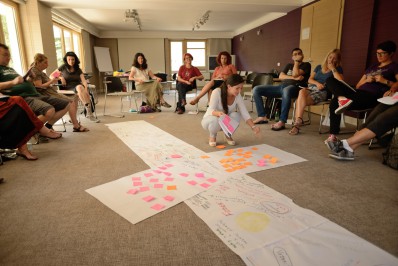At the end of the first phase of the Training for Trainers, the participants formed groups and chose topics for their workshops. (For more about the concept of this programme, click here).

Seven small teams were formed, and the topic chosen concerned dealing with the past, reconciliation and peacebuilding: prejudice and discrimination, identities, narratives, memorialisation, identities and borders, reconciliation and power. Each team was assigned two people from the CNA Training Team for support, guidance and consultation. We were particularly glad to see that everyone chose to step out of their comfort zone, that they chose topics and teams that were challenging, not safe. During June and July, seven follow-up meetings were held, three in Belgrade and four in Sarajevo, where two to three days were spent designing the independent workshops. It seems the travelling itself (the participant from Kosovo coming to Belgrade, the participant from Macedonia to Sarajevo, etc.) was useful because the participants met and got to know different contexts, acquiring new insights on the way. Of course, it was also an opportunity to socialise 🙂
Everyone was very excited and curious upon arrival in Ivanjica, a small town in the south-west of Serbia, for the third phase that took place from 8 to 18 August at Hotel Park. The participants were excited about their workshops and eager to start working. Each small team had a whole session (morning or afternoon) for their workshop that they had designed and lead themselves, with the support of the training team. At the end of each day, we held evaluation meetings with each workshop team individually, and at these meetings we assessed the workshops, the teamwork, insights gained and difficulties encountered in order to make the best of this learning opportunity based on practical training experience.

Just like when they were choosing their teams, when it came to selecting the topics and exercises, the participants opted for new exercises that they had not seen before and were not reluctant to explore new situations in their roles as trainers. With a lot of respect for each other in the teams and with good distribution of responsibilities, they also had a lot of support from the rest of the group during the exercises. This solidarity and cooperation was useful in some less well-thought-out situations during the exercises so that shortcomings and errors on all sides were easily transformed into valuable experiences.
In the second part of the training, we focused on the role of the trainer, ethics in peacebuilding, and the powerful emotional experience everyone went through in the first part of the training formed the basis for our thinking, conclusions and insights. We devoted one session to the “role of the sexes in society” because we assessed this as necessary. However, the deepest impression was achieved by the Theatre of the Oppressed/Forum Theatre that we spent a whole day on and that was a novelty for almost all the participants, while reminding the training team who this method, in a creative and motivated group, can have a strong impact in terms of empowering people for the daily struggle against injustice.

Thus, in Ivanjica, we completed the part of the programme for acquiring and trying out training skills. During the fourth phase that will be held from 7 to 13 November 2014 in Andrevlje in Fruška Gora, Vojvodina, Serbia, we will deal with expanding ideas, networking and support for actions and activities to be planned and implemented in 2015 by participants of the 6th CNA Training for Trainers programme.
Photo gallery
N.H.,K.M.